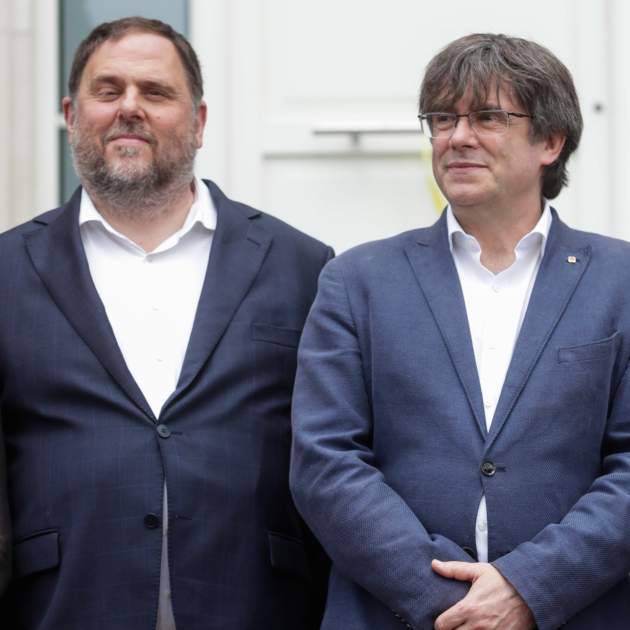Public prosecutors on collision course. The Spanish prosecutor general is in favour of amnestying all the crimes attributed to the leaders of the Catalan independence process and directly orders the Supreme Court prosecutors to do so. Álvaro García Ortiz orders his Supreme Court subordinates Fidel Cadena, Javier Zaragoza, Consuelo Madrigal and Jaime Moreno to respond to the judges Pablo Llarena and Manuel Marchena that all the crimes linked to the October 1st referendum "are included" in the scope of the amnesty law and that, therefore, all the leaders of the independence process must be amnestied for these. This includes all those prosecuted or convicted of misuse of public funds: president Carles Puigdemont, former vice president Oriol Junqueras and former ministers Toni Comín, Lluís Puig, Jordi Turull, Raül Romeva and Dolors Bassa. For their part, on the other hand, the four prosecutors in the process refuse to regard the misuse of funds offences related to independence process spending as included in the amnesty because they consider that the the process signified "undoubted personal enrichment" and went against the financial interests of the European Union, two exceptions provided for in the amnesty law. This interpretation made by the Supreme Court prosecutors, says their superior, "contradicts the will of the legislator, and the literal tenor of the articles and the arguments are insufficient to raise any doubts about whether the misuse of funds offence are able to be amnestied", as the prosecutor general writes in his decree, to which ElNacional.cat has had access.
Contrary to this thesis, the prosecutor general, who always has the last word, maintains that the prosecutors "confuse" the intention of profiting financially required by the crime of misuse of funds with "the personal enrichment of a patrimonial nature" which would mean, under the amnesty law, that the offences would not qualify for an amnesty. "The patrimonial damage to the administration, as a result of the crime of misuse of funds, is not comparable to personal enrichment of a patrimonial nature", he argues. And he adds that the facts of the case "do not directly affect" the financial interests of the EU. He also maintains that it is necessary to request that "interim measures be lifted" - such as the arrest warrants against Puigdemont, Comín, Puig and Rovira: this is "appropriate and necessary, in accordance with the legal system" in cases where "it is appropriate to declare that criminal liability is extinguished".
In addition, in the document to which this newspaper has had access, Álvaro García Ortiz also makes some criticisms of the four Supreme Court prosecutors: "They make profuse use of arguments that go beyond a strictly legal plane, which compromises the necessary image of neutrality and impartiality of the public prosecutor's office and which are totally inappropriate".
Misuse of funds and EU financial interests
In his argumentation, consulted by this newspaper, the prosecutor general states that "as long as the person responsible for the crime of misuse of funds had limited himself to diverting public funds with the sole purpose of financing, paying for or facilitating the calling and/or celebration" of either the first independence consultation in 2014 or the second vote on October 1st, 2017 - this quotation having been taken from the wording of the amnesty law - it must be considered that this conduct falls within the scope of the amnesty "due to the rule of law". "Public funds were administered in a disloyal manner with the sole purpose of holding a self-determination referendum, without the defendants' other financial interests being involved", he concludes.
The prosecutor general also comments on the alleged impact of the crimes on the financial interests of the European Union and states that it is difficult to "accept" that the conduct was a "serious threat" to the EU. "The account of proven facts in the sentence handed down by the Supreme Court expressly states that neither was this the real objective of those found guilty, nor was their action objectively suitable for achieving the independence of Catalonia", he asserts. And he repeats a key idea: "The hypothesis that the secession of Catalonia, if it were to happen and be viable, would have had a real effect on the interests of the EU is difficult to prove, since the specific terms of how this imaginary event could have taken placeare not known, and nor is it known whether Catalonia could have reached a specific economic agreement with the European Union".
The steps from now on
The next steps this morning were for the four prosecutors to respond in writing on whether they would comply with the order of the prosecutor general or if, as was already taken for granted, they would maintain their refusal, invoke Article 27 of the Statute of the Public Prosecutor. In this second case, a meeting of the the Board of Prosecutors will have to be held, which García Ortiz had already asked prosecutors to pencil in to their schedules for next Tuesday, June 18th. The two reports will be debated there and García Ortiz, after listening to all the positions, will express his final opinion, which "may or may not coincide with the majority opinion", as prosecution sources have told ElNacional.cat.
